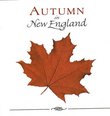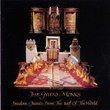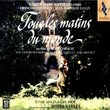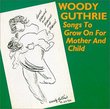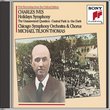| All Artists: Theodor Kullak, Alexander Dreyschock, Niklas Willen, Glasgow BBC Scottish Symphony Orchestra, Piers Lane Title: Kullak / Dreyschock: Piano Concertos Members Wishing: 0 Total Copies: 0 Label: Hyperion UK Release Date: 8/10/1999 Album Type: Import Genre: Classical Styles: Forms & Genres, Concertos, Symphonies Number of Discs: 1 SwapaCD Credits: 1 UPC: 034571170862 |
Search - Theodor Kullak, Alexander Dreyschock, Niklas Willen :: Kullak / Dreyschock: Piano Concertos
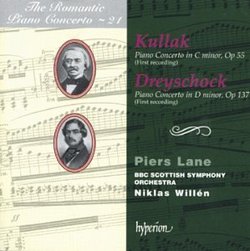 | Theodor Kullak, Alexander Dreyschock, Niklas Willen Kullak / Dreyschock: Piano Concertos Genre: Classical
|
Larger Image |
CD DetailsSimilarly Requested CDs |
CD ReviewsOne of the Best in the Series Phillip J. Rodgers | West Central GA USA | 04/01/2000 (5 out of 5 stars) "This CD - 21st in the series - is one of Hyperion's best. It includes two interesting and enjoyable concerti by artists that were once taken very seriously. First up is Theodor Kullak (1818-1882). Kullak was a student of Karl Czerny (who was himself a student of Beethoven and the teacher of Franz Liszt), and one of the most respected teachers of the 19th century. Julius Reubke, Moritz Moszkowski, Amy Fay, and Xaver Scharwenka were all students of his. Many of his students went on to study with Liszt. The Piano Concerto in C minor, Op. 55, which was composed around 1850, is (as one of the previous reviewers has indicated) a curious amalgam of Beethoven and Chopin. While not a masterwork, by any stretch of the imagination, it is enjoyable. The last movement gambols along in a spirited Allegro moderato con fuoco that tolerates no frowning. Our second composer is Alexander Dreyschock (1818-1869). Dreyschock was something of the Gyorgy Cziffra/Vladimir Horowitz of his day. Kullak - who would have know, if anyone did - said that Dreyschock's technique was better than Liszt's. He was best known for playing Chopin's C minor study Op.10, #12 with octaves in the left hand as opposed to the original single notes! Dreyschock did this all over Europe. Musicians of the calibre of Johann Baptist Cramer and Felix Mendelssohn testified that Dreyschock pulled this off. Dreyschock's Piano Concerto in D minor, Op. 137 is a very Mendelssohnian piece. It comes across as something like Mendelssohn on crack: that is to say Mendelssohnian melodies punctuated with lightning octave passages, skipping chords and skittering scales. The effect is quite bracing. Perhaps alone among the posted reviewers I prefer the Dreyschock concerto to the Kullak. It is well written, both for the piano and orchestra, and is great fun. I'll take a souffle like this over more portentous fare any day. Both pieces are played with impeccable finish and brio by Piers Lane, who is given yeoman support by Niklas Willen and the BBC Scottish Symphony. If you like virtuosity, and the piano, then you will enjoy this." My CD of 1999 Phillip J. Rodgers | 11/09/1999 (5 out of 5 stars) "This is the best CD I bought this year. The melodic line of the Kullak Concerto draws me back to it frequently. (Esp the first Movt) The third movement is extremely catchy and fun. Similarly the Dreyschock has some great moments in it. This is music for people who like easy-listening Classical music. It is well recorded with Brilliant soloist and orchestra." Entertaining, little-known fare V. Wilson | Cambridge, MA United States | 02/23/2000 (5 out of 5 stars) "This is yet another winner in this long-running Hyperion series. Once again, they have ferreted out two intriguing, if not profound, piano concertos and offered them in sterling performances and sound.The Kullak is the heavier of the two pieces. One can hear a lot of Chopin in this piece, along with some Beethoven in the first movement. The slow movement contains a beautiful aria interrupted by some strikingly dramatic music. The finale is an early example of the puckish, devilish music that Liszt was to make famous with his Totentanz. It does run on a bit long, however.The Dreyschock is doesn't have a length problem, as it's only 24 minutes long. It's full of fun piano fireworks and spritely themes that wont last too long in your head. But it IS fun.All I can say is get this disk if you like romantic music. It's a pleasant diversion from the plethora of recordings of the same six romantic piano concertos we always hear (the 2 Brahms, Grieg, Schumann, Chopin 1 and Tchaikovsky 1)."
|

 Track Listings (6) - Disc #1
Track Listings (6) - Disc #1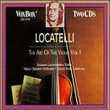

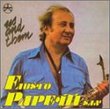
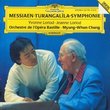
![Seussical [2000 Original Broadway Cast]](https://nationalbookswap.com/cd//m/02/4802/514802.jpg)
